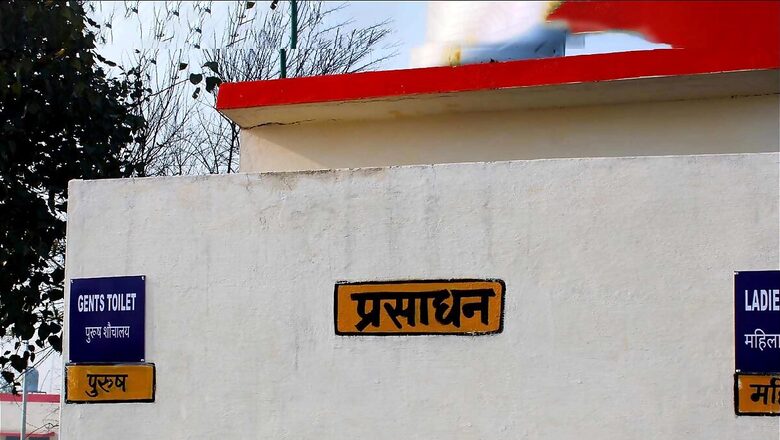
views
If you’re a woman, you’ve experienced firsthand the horror of a dirty toilet when you’re having your period (and even when you’re not having your period). Of course, it’s better than having no toilet at all, but that is small comfort.
Harpic, India’s leading brand in the lavatory care category, has led the way in communicating the importance of clean toilets and good toilet hygiene on health. Women are often at greater risk of toilet borne infections, not only because they have to get physically closer to the toilet to use it, but also because of problems that are specific to women: like menstruation and pregnancy (when she needs to go to the toilet very frequently!).
Intimate hygiene is exactly as it sounds: intimate
For most of us urban women, being without our personal toilets and the privacy they afford is unimaginable. For many of our sisters who live in the heartland rural areas, this was a grim reality till just a few short years ago: no toilets, no privacy, no convenience. No place to change their menstrual pads, no place to dispose of them, no place to wash them. Also, they could only change during the limited hours of early morning and evening, when they wouldn’t be seen by others.
What compounds these problems is the mindset towards menstruation. By and large, it is considered ‘dirty’, ‘unclean’ and ‘shameful’, as opposed to a natural, physical process that every woman goes through during the bulk of her years on earth. These attitudes create further taboos on discussion of menstrual health – we are not good at talking about things we’re ashamed of.
Young girls are given the information they need in the form of hushed injunctions from their mothers, who learned from their mothers. If the mother didn’t have access to a toilet growing up, she passes on the same practices that she used – practices that put enormous strain on the body, and create physical situations ripe for infectious disease.
The clean toilet advantage
When women have access to clean toilets:
They feel safe changing their clothes, and their menstrual pads: Knowing that no one is suddenly going to walk into your private space allows women to take care of their business with ease.
They develop better toilet habits: This peace of mind translates into better toilet habits: washing the reusable pad then and there, washing themselves before changing pads, and so on.
They can actually sit on their toilets: Ask any woman if she’s used the ‘air chair’, and she’ll say yes. As women have to get physically in contact with toilets to use them, a dirty toilet poses a whole host of logistical problems when using the toilet, and more so, when they need to change their pads and wash themselves – two actions that are near impossible to achieve on an ‘air chair’.
They have lower rates of infection: Women are particularly at risk for urinary tract infections from dirty toilets, because a woman’s urethra (the tube from the bladder to where the urine comes out of the body) is shorter than a man’s. This makes it easier for bacteria to get into the bladder. They’re also at risk of catching several infections from reusable pads, if these pads are not properly washed and sterilised, they can pose serious health risks.
They can go as often as they need: When a toilet is a clean and safe space, women feel free to use it as often as they need. This means that they are able to take better care of their menstrual hygiene, and also that they are not ‘holding it’. Not holding it has several advantages – it is kinder to internal organs like kidneys, and it means that women are far more likely to hydrate adequately.
The Mindset Gap
Despite the fact that this is something that nearly every woman goes through for around 40 years of her lifetime, menstruation isn’t talked about in polite society. However, this is a taboo that hurts women in several ways: many women experience complications that they don’t realise are out of the norm. They also suffer from avoidable infections caught from unhygienic toilets and poor hygiene practices, and again, they suffer from these infections for longer, because they hesitate to talk about them. By inextricably linking menstruation with shame, we make it hard for women to get help, and to help others in the same situation.
Of course, menstruation isn’t the only place where these mindsets create a problem. The Sub-Group of Chief Ministers on Swachh Bharat Abhiyaan also observed that just making toilets wasn’t enough to ensure their use – behavioural change needed to be orchestrated. They maintain that behavioural change is an area of continued focus, and have made several recommendations on how to bring about this shift in mindsets.
In India, we’re lucky that the GoI has several partners in this worthy endeavour. Specific to menstruation, the movie Pad Man went a long way in normalising conversations about menstruation. Based on a true story, this movie also sparked a social movement where celebrities (both male and female!) posed with sanitary pads while doing the most ordinary things – going to the gym, while shopping, and so on.
Brands too, have shouldered the responsibility of communicating the importance of good toilet hygiene and strong toilet habits, and their link to the health of the entire family. Harpic, for instance, communicates not just to women, but to children too. Through their partnership with Sesame Workshop India, engaged with 17.5 million children across India to promote positive toilet sanitation, hygiene knowledge and behaviours among children and families through schools and communities.
Harpic, together with News18, created the Mission Swachhta aur Paani initiative 3 years ago. It is a movement that upholds the cause of inclusive sanitation where everyone has access to clean toilets. Mission Swachhta aur Paani advocates equality for all genders, abilities, castes and classes and strongly believes that clean toilets are a shared responsibility.
As a part of this campaign, on the occasion of World Health Day on April 7th, Mission Swachhta aur Paani are bringing together policy makers, activists, actors, celebrities and thought leaders with a panel from News18 and Reckitt’s leadership to address behavioural change on toilet use and sanitation, and how people from all walks of life can help further the cause.
The event will feature a keynote address by Reckitt leadership, interactive Q&A sessions, and panel discussions. The speakers include Union Minister of Health & Family Welfare, Shri Mansukh Mandaviya, Deputy CM of Uttar Pradesh, Shri Brajesh Pathak, Director of External Affairs & Partnerships, SOA, Reckitt, Ravi Bhatnagar, UP Governor Anandiben Patel, actors Shilpa Shetty and Kajal Aggarwal, Regional Marketing Director of Hygiene, Reckitt South Asia, Saurabh Jain, sportsperson Sania Mirza and Padma Shri S. Damodaran, Founder of Gramalaya, among others. The event will also feature on-ground activations in Varanasi, including a visit to Primary School Naruar and a ‘Chaupal’ interaction with sanitation heroes and volunteers.
A Swasth Bharat will emerge from a Swachh Bharat. Shouldn’t the women who give birth to our next generation be at the forefront of this national conversation? Join us here to add your voice to the discussion.
Read all the Latest News here



















Comments
0 comment